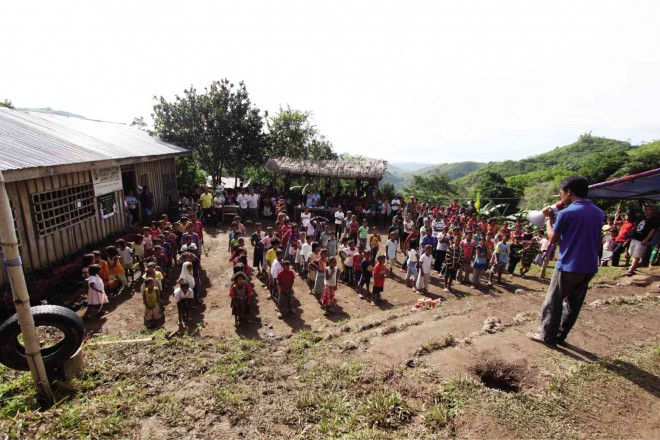
Lumad students form lines for a flag-raising ceremony at the Salugpungan Ta Tanu Igkanugon Community Learning Center. KARLOS MANLUPIG/INQUIRER MINDANAO
Catholic bishops are calling for an investigation into the killing of three lumad leaders in Surigao del Sur, allegedly by paramilitary forces, even as they criticized the Aquino administration’s alacrity in defending the suspect group.
“[We ask] the government for an honest, thorough, impartial and speedy investigation so that the guilty may be held to account for their wrongdoing,” said Archbishop Socrates Villegas, the president of the Catholic Bishops Conference of the Philippines, in a statement.
The CBCP is “profoundly disturbed by reports that national leaders have been quick to exonerate the militia group of wrongdoing,” he said.
“This alarming eagerness to deny culpability does not augur well for truth and for justice,” Villegas added.
According to Villegas, such declarations could only be believable after the conduct of a “reliable and trustworthy investigation by impartial and competent persons.”
“If made before any such investigation, they disturbingly suggest a refusal to hold accountable those to whom the administration so eagerly extends its mantle of protection,” he said.
According to press reports, on Sept. 1, a militia group called the Magahat-Bagani Force killed Emerito Samarca, executive director of the Alternative Learning Center for Agricultural Livelihood Development (Alcadev), Dionel Campos, a community leader from the Mapasu indigenous group, and the latter’s cousin, Aurelio Sinzo, in Barangay (village) Diatagon, Lianga, Surigao del Sur.
Alcadev is privately run but state-regulated learning institution that provides basic and technical education to lumad children in communities rarely reached by government services.
Villegas said he found it “troubling” that a militia group had been suspected, noting that these paramilitary groups which government makes use of for counter-insurgency and counter-rebellion maneuvers “do not fall under a clear, established and accessible chain of command.”
He said their association with the government could be “pernicious, for while they act with the tacit consent, if not authority, of state agents, they cannot be held to account for their actions by the regular channels of accountability and attribution that exist in the regular armed forces and police.”
International efforts
Meanwhile, the militant Karapatan human rights watchdog has written to the special rapporteurs on human rights and indigenous peoples at the United Nations Human Rights Council (UNHRC) urging them to investigate the lumad killings.
“We want international bodies to know what is happening in Mindanao—that the lumad, in defense of their land, are being killed and forced to leave their communities,” said Karapatan secretary general Cristina Palabay.
More than 2,000 Manobo residents fled Lianga town after the killing of Samarca, Campos and Sinzo. Samarca was found with a slit throat and gunshot wounds inside the Alcadev office. Campos was gunned down in front of community members, while Sinzo was beaten with a wooden stick before being shot.
Witnesses and local police tagged the Magahat-Bagani Force, a group said to be trained, armed and funded by the military as part of its counter-insurgency program.
Surigao del Sur Gov. Johnny Pimentel commented that “the military has created a monster that it can no longer control.” He later disclosed that military officials had asked him to tone down his statements.”
Karapatan raised the issue with the UNHRC through letters sent to Victoria Lucia Tauli-Corpuz, special rapporteur on the rights of indigenous peoples; Christof Heyns, special rapporteur on extrajudicial, summary or arbitrary execution; Michel Forst, special rapporteur on the situation of human rights defenders; and Chaloka Beyani, special rapporteur on the promotion of the human rights of internally displaced persons.
Part of policy
“We reiterate our position that the political killings happening right now are part of the government’s policy and not simply an internal conflict among indigenous peoples as the government wants the public to believe,” Palabay said in a statement.
For his part, Armed Forces of the Philippines spokesman Col. Restituto Padilla said the Karapatan move to “demonize” the military was to be expected.
Expected move
“The attempt to internationalize the issue and demonize the government is always an expected move on their part. It is obviously part of their agenda to hurl all accusations and blame everything on the AFP to besmirch the AFP’s reputation,” Padilla said.
He stressed that “the AFP was not involved in the incident and was working and cooperating fully [with] the Philippine National Police to ascertain the facts regarding this disturbance.”
It was also conducting an internal investigation “to ascertain if the AFP actions were appropriate relative to this unfortunate incident,” Padilla said.—Tina G. Santos, Erika Sauler and Jaymee T. Gamil
RELATED STORIES
CBCP to Aquino gov’t on lumad killings: Probe before concluding
Aquino on ‘lumad’ killings: There is no campaign to kill anybody